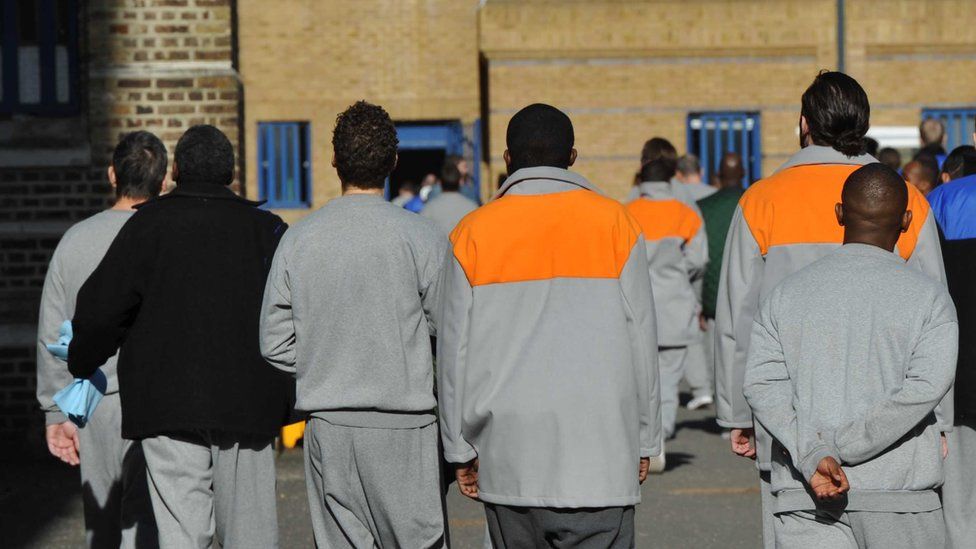Minorities more likely to be jailed for drug dealing, study suggests
- Published

Black and Asian men are more likely to be jailed for drug dealing offences in England and Wales than white men, a study of 14,000 people suggests.
The Sentencing Council looked at the penalties received by defendants aged 26-50 for possession with intent to supply from April 2012 to March 2015.
Its analysis also found men were more likely to be jailed than women.
The council said it was seeking views on whether its sentencing guidelines could lead to discrimination.
Its study found that for possession with intent to supply a class B drug, 37% of white offenders would be expected to receive an immediate custodial sentence, compared with 46% of Asian, 44% of black and 46% of Chinese and other ethnicities.
For a class A substance, around 93% of white offenders, 95% of Asian offenders and 95% of black offenders would be expected to be jailed.
The length of sentence also differed, with Asian offenders being jailed for an average of 4% longer, equal to around one month extra, than white counterparts.
Black and other ethnicity offenders did not have statistically different sentence lengths to white offenders.
The researchers also compared men and women and found 37% of men would be expected to be jailed for possession with intent to supply a class B drug, compared with 20% of women.
For class A substances, around 93% of male offenders and 85% of female offenders would be expected to be sentenced to immediate custody.
Men received sentences that were on average 14% - or around five months - longer than women.
Researchers said not all the factors considered by judges could be taken into account in their analysis, meaning the results should not be regarded as conclusive.
But the organisation said it would be seeking views on whether its guidelines could potentially be interpreted in ways that could be leading to discrimination.
Lord Justice Holroyde, chairman of the Sentencing Council, said: "The sentencing guidelines are intended to apply equally to all offenders, irrespective of their sex or ethnicity.
"In drafting the guidelines, the council always takes great care to use language that is clear and unambiguous and will ensure the equal application of sentencing factors to all social groups.
"We do recognise, however, that there is potential for draft guidelines to be interpreted in different ways.
"The council is seeking views on whether any of the factors in the draft drug offences guidelines could be interpreted in ways that could lead to discrimination against particular groups, and we are asking whether there are any other equality or diversity issues the guidelines have not considered."
Legal system 'overwhelmingly white'
Andrea Coomber, director of legal reform group Justice, said "significant investigation" was required to properly understand the research's findings.
She said: "We need to look at who's in the system, who are the people who are on the bench, who's doing the representation.
"We know that we have a legal system that is overwhelmingly white, the judges are overwhelmingly white. You can sit at the Old Bailey for a day and not see any black barristers, and if you were a black boy in the dock... you do think that the system is skewed against you."
The council is also proposing changes to guidelines to reflect the growing exploitation of children and vulnerable people by county lines drug gangs.
The new draft guidelines would allow this exploitation and so-called cuckooing - where a home is taken over for drug dealing - to be taken into account as "culpability factors".
A 12-week consultation on the proposals will close on 7 April.
Lord Justice Holroyde added: "The nature of offending is changing and we are seeing more vulnerable people including children being exploited either through grooming or coercion.
"The proposed guidelines will provide guidance for courts and clear information for victims, witnesses and the public on how drug offenders are sentenced."
A Ministry of Justice spokeswoman said: "We are working across government and with partners to tackle the over-representation of BAME individuals in the criminal justice system, which we know has deep-rooted causes.
"That work includes taking forward the recommendations in David Lammy MP's extensive independent review and developing a number of interventions aimed at reducing disproportionality."
- Published16 November 2016
- Published10 January 2020